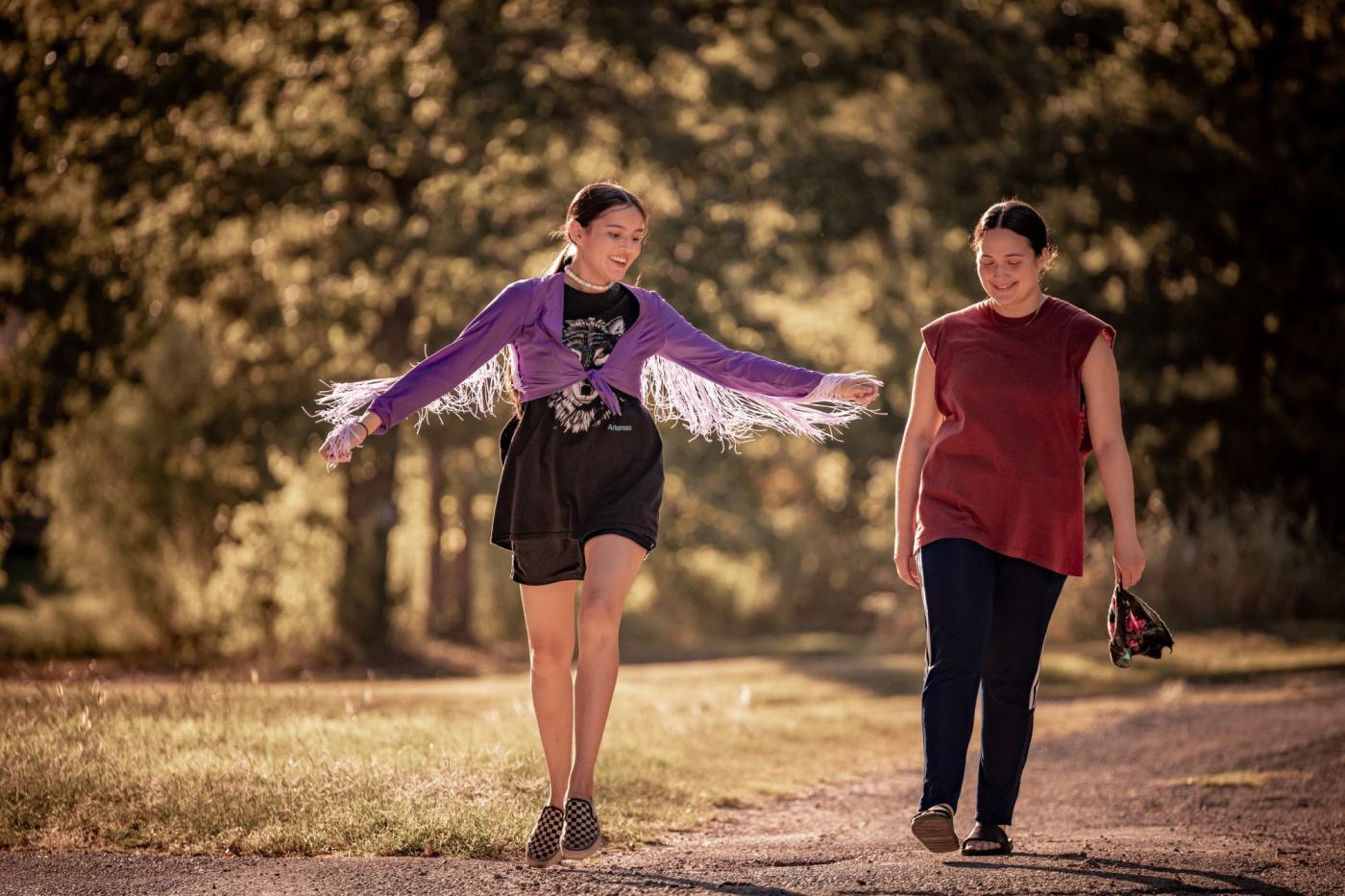
‘Fancy Dance’ director Erica Tremblay talks about creating complex Native stories
Even as “Reservation Dogs” and “Dark Winds” have brought Native American stories to television, Indigenous films have remained scarce. But Erica Tremblay, who is a member of the Seneca Cayuga Nation, always wanted to be a feature film director, whether she was working in strip clubs or producing corporate content videos, directing documentaries, or working as a writer and story editor.
“This was always the dream,” says Tremblay, about her first film, “Fancy Dance,” which premiered at the Sundance Film Festival and is now getting a theatrical release on June 21 and will begin streaming on Apple TV+ on June 28. “All those experiences gave me the skills I needed to make this movie.”
“Fancy Dance” stars Lily Gladstone in her first film since “Killers of the Flower Moon” as Jax, who is desperately searching for her missing sister, Tawi. Complicated and quick to anger, Jax is not only caring for her teen niece Roki (Isabel Deroy-Olson) but she’s using her as an accomplice for various crimes. Jax’s family dynamics are equally complicated: her half-brother JJ (Ryan Begy) is with the tribal police; her White father, Frank (Shea Whigham) left the reservation years ago after Jax’s mother died and remarried a White woman, Nancy (Audrey Wasilewski), who has a savior complex.
It’s a quiet movie packed with emotions, a character study with thriller elements and an unflinching look at modern life on the reservation. “We deserve characters that are complicated and represent the full breadth of humanity,” says Tremblay.
This interview has been edited for length and clarity.
Q: Does the presence of more Native stories like “Reservation Dogs” free you up to tell different types of stories?
Native representation used to be either the violent warrior in a period piece or a model minority, the most perfect version of what a Native American is. But now we can have these nuanced characters. I have so many women like Jax in my life who are holding on to control where they can and doing the best to get by and provide safety to the best of their abilities. Jax will do whatever it takes, and sometimes she’s making decisions that you don’t agree with, but her intentions are coming from a place of love.
But we wanted to give that same treatment to Frank — he isn’t an evil White man. He is trying his best in a world pitting two cultures against each other because of these colonial ways. Frank is a nuanced character who loves his children, but can’t quite show up for them the way they need him to.
Q: But Nancy is more rigid and undermines Frank’s efforts.
She still thinks she is doing the right thing. One of my favorite scenes is when Nancy gives Roki her old ballet slippers to make up for the fact that they are not taking Roki to dance at the powwow. She thinks she’s going to bond with this child over their love of dance, but Roki says, ‘You don’t understand. This isn’t about learning steps; this is a ceremonial community cultural gathering that cannot be replaced.’
Nancy has the opportunity to reach across and make a bridge to this child and say, ‘OK, Let’s go to the powwow this weekend. It’s just a couple of hours drive.’ But she’s terrified that if the child stays connected to her culture then they won’t be able to bond.
I’m not saying that Nancy is evil, but even in my own experiences with non-native family members, I find that this fear that’s so rooted in White supremacy, which comes from a place of insecurity. How much better would it be if more bridges were built as opposed to people saying, ‘I don’t understand this and so I’m going to be rigid and just take control.’
There are all of these moments where Native people come into contact with these people who want to save Natives but in their very close-minded way. This isn’t violent genocide, but these very small things seep into a community and create very unsafe environments.
We’re not trying to hit people over the head with these topics – ultimately, it’s a story about two Native women who persevere through a very traumatic experience by loving each other and supporting each other. But on the periphery, we have issues like the forced removal of children and the Missing and Murdered Indigenous Women crisis. Hopefully, because we’re grounding it in this very human way people will recognize their roles in perpetuating the continued violence against Native peoples and find ways to build bridges and be better neighbors.
Q: How did your experience in the sex industry shape the movie?
The strippers in the movie are human, because I’m drawing from my own experiences. I’ve always hated the portrayal of strip clubs and film and television and I love the idea of taking a place that hasn’t been accurately represented and shining a light on what it’s really like. I also chose to always shoot eye level with the dancers versus being down below because we’re not telling the story through the john’s eyes. We’re up with the women because they’re the ones who we’re focused on. And so just in changing the perspective changes the gaze.
I worked with many dancers who had kids and were great moms and were providing for their families and doing the best that they could. Being a stripper is a job, and it’s a valid job. I wanted Tawi to be a stripper because just as librarians deserve to be found, strippers deserve to be found. You deserve justice if something bad has happened to you no matter where you come from or what your job is.
Q: You generally don’t spell out all the issues facing the women in this movie but let it play out organically. Was it difficult as a first-time director to keep a light touch with such serious topics?
As a director, it’s all about your voice and finding your vision. When you’re making a film about a community that hasn’t been told before, you have to remember that if you spend 30 minutes of the movie explaining all of these things you wouldn’t get to tell Jax’s story. So it’s up to the non-Native viewers to hang on tight and trust me, to keep going with the essential human elements and now they’re going to understand it in the end. So as the director, you have to trust the audience.
Related Articles
Talking to Kevin Costner about ‘Horizon’: He’s bet everything, will it pay off?
‘Separate lives’: George and Amal Clooney’s marriage stressed by work, world events
‘Bad Teacher’ landed Phyllis Smith ‘Sadness’ role in ‘Inside Out 2’
Death’s a giant bird in ‘Tuesday,’ a winning mashup of fantasy & drama
Foreclosure auction of Kevin Spacey’s Baltimore home postponed as actor says he is millions in debt


